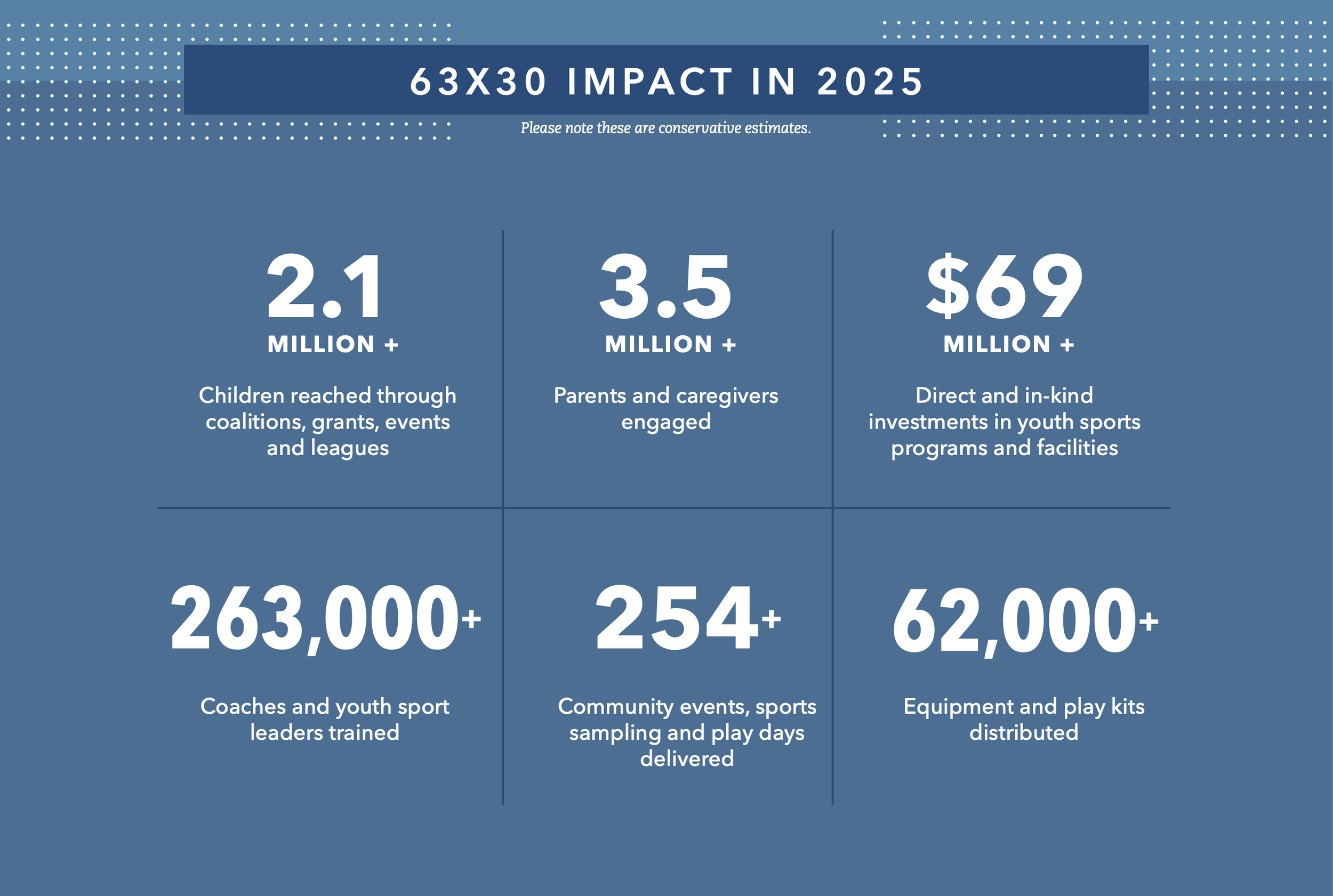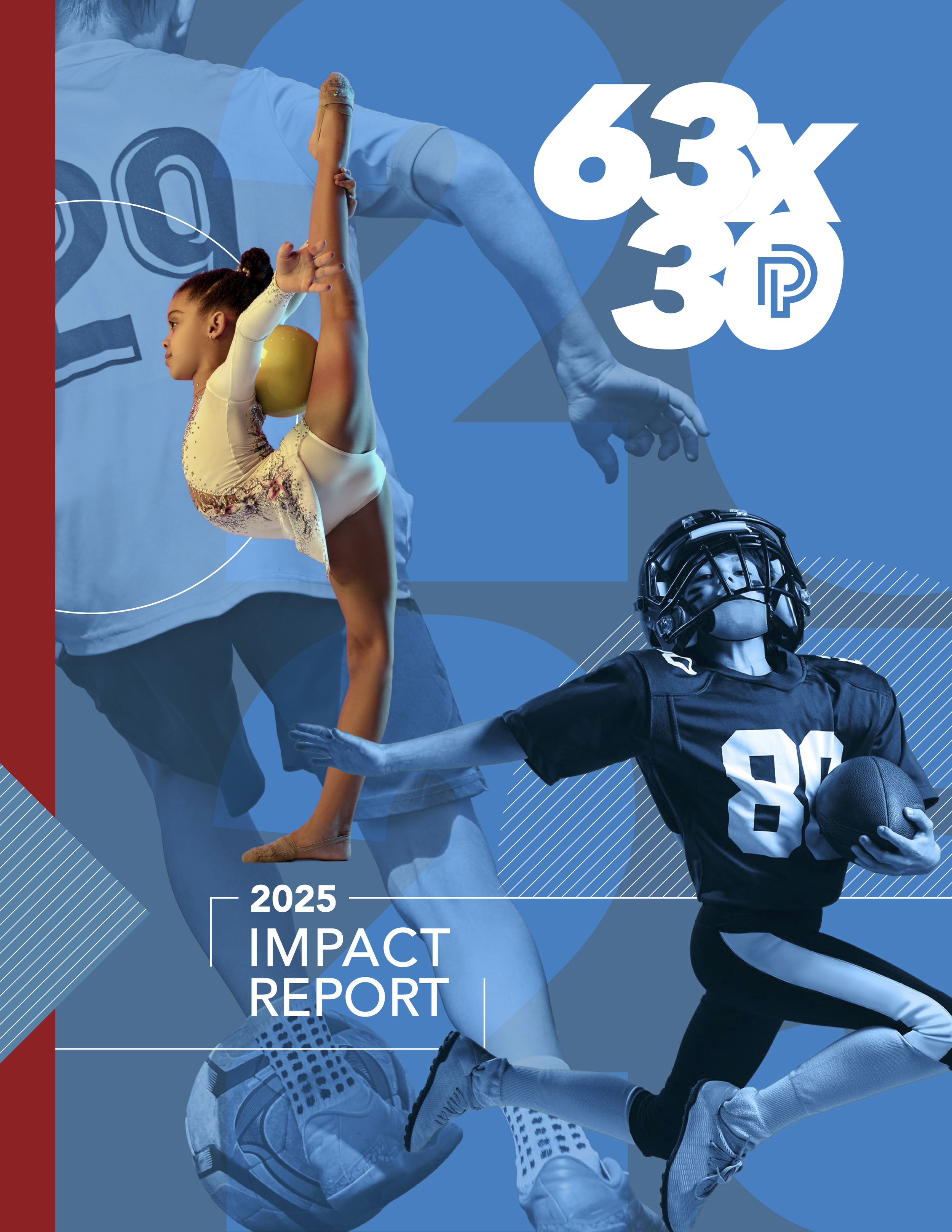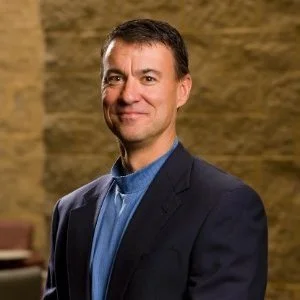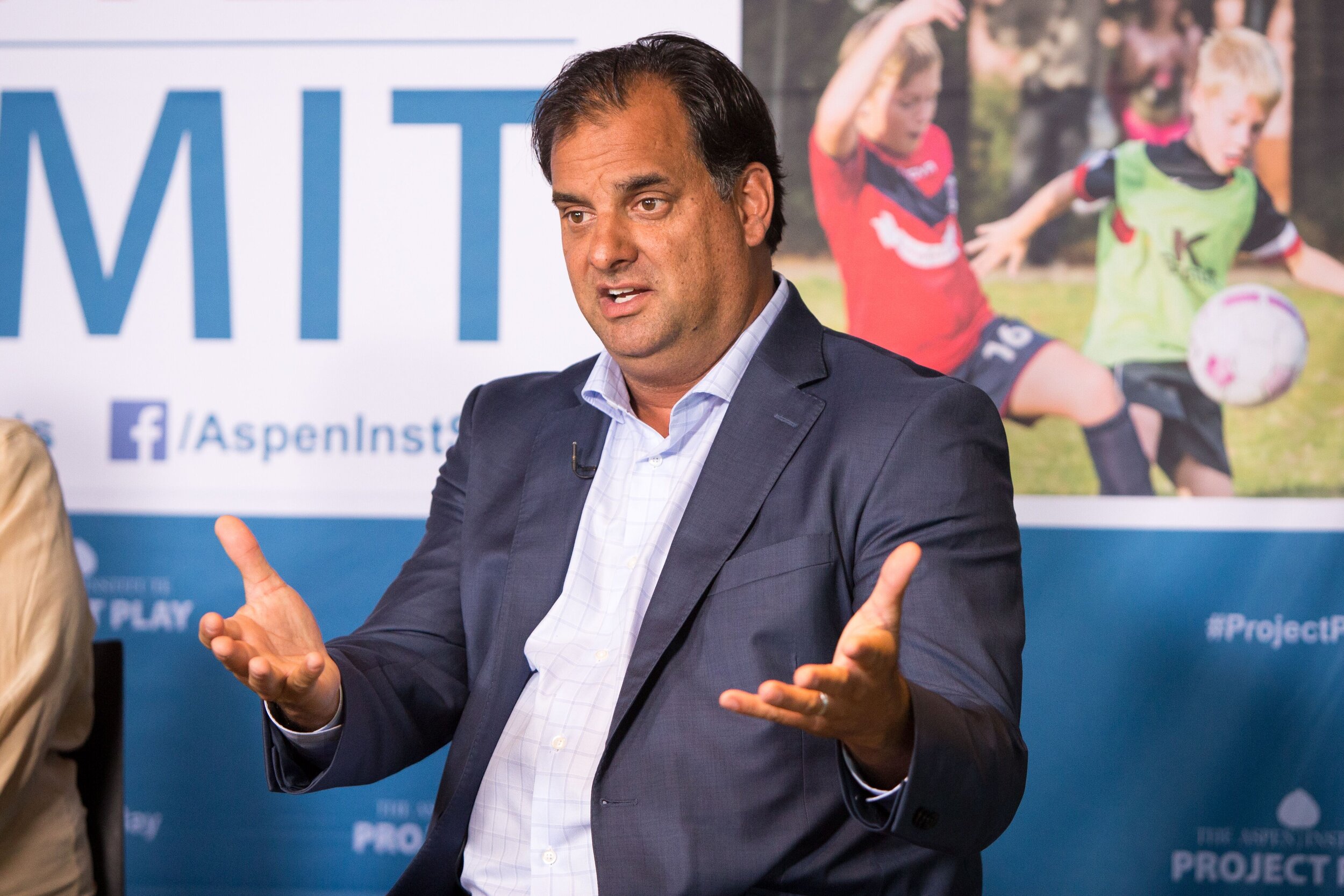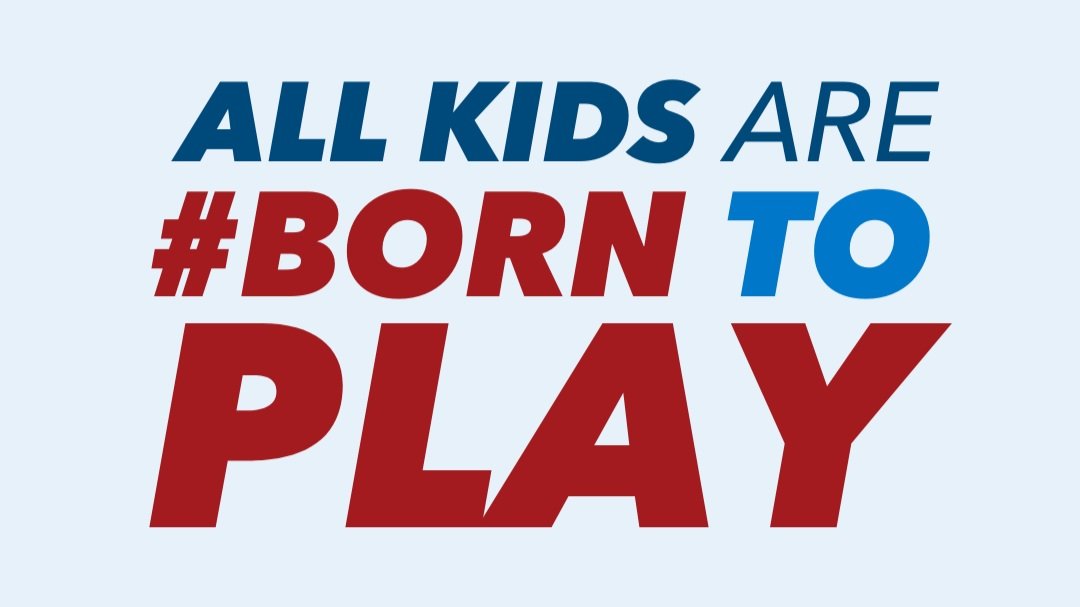For the first time, the nation has a public health goal for youth participating in sports: 63% by the end of the decade, a target set through the Healthy People 2030 program administered by the government.
The Project Play network is embracing that goal as its own. Leading the call to action is a national roundtable of 20 organizations, convened by the Aspen Institute, that have made multi-year commitments to take mutually reinforcing actions aligned with a strategic plan: 63X30.
Organizations participating in the 63X30 Roundtable include: DICK’S Sporting Goods Foundation and GameChanger, ESPN, Gatorade, Hospital for Special Surgery, LeagueApps, Little League Baseball and Softball, Major League Baseball, Major League Soccer, National Basketball Association and Women’s National Basketball Association, National Recreation and Parks Association, Nike, PGA of America, Players Health, Ralph C. Wilson, Jr. Foundation, SportsEngine, Stack Sports, TeamSnap, Under Armour, U.S. Olympic & Paralympic Committee, and U.S. Tennis Association.
55.4%
U.S. youth ages 6-17 who played organized sports in 2023, according to the National Survey of Children's Health
63.3%
Federal government goal for youth sports participation by 2030
How will we get there?
VISION
A youth-centered ecosystem that serves all.
MISSION
Rally behind a time-bound goal, to unlock ambition across the eight sectors that touch the lives of children as recognized by Project Play: Business & Industry, Community Recreation Groups, Education, National Sport Organizations, Policymakers & Civic Leaders, Public Health, Tech & Media, and Parents.
GOAL
Get 63% of young people playing sports by 2030, up from 54%, as reflected in the lastest available data from the National Children's Health Survey.
Special focus will be placed on underrepresented populations, including youth from low-income homes and those with special needs.
We need to get at least 3 million more youth (ages 6-17) playing organized sports by improving:
RECRUITMENT
We must reduce barriers that keep families from enrolling children.
RETENTION
We must reduce the high attrition rate of youth, who often quit by age 11.
Members will activate and drive progress in three buckets, each guided by a vision:
PEOPLE
Parents and caregivers are empowered to nurture positive experiences, and providers are equipped with the skills and support to deliver inclusive, high-quality programs that help youth thrive on and off the field.
PLACES
Every child has access to safe, vibrant places to play, fostering health, pride, and belonging. Community leaders are empowered to revitalize local programs and transform neighborhood spaces into hubs of connection, inspired by the power of sport.
PROGRAMS
Every child has access to developmentally appropriate activities that foster joy, growth, confidence, and well-being. Guided by best practices and rooted in the human rights of children, providers will deliver transformative opportunities to play.
2025: When we educate and rally parents
KEY AUDIENCE
Parents, guardians and caregivers, with special focus on adults whose children are entering the sport ecosystem and those from underrepresented populations.
OBJECTIVE
Equip them to nurture their child’s growth and development through sports.
STRATEGY
Flood them with messages and resources to help them understand the true benefits of sports, how to get and keep kids playing, where to find quality programs, and how they can be change agents in their communities.
History of the Roundtable
Since 2017, Project Play has engaged a cross-sector roundtable of leading organizations committed to taking mutually reinforcing actions aligned with Project Play’s youth sports framework for getting and keeping children active through sports. Guided by the Aspen Institute and the principles of Collective Impact, the group meets, shares knowledge, and works together to grow the quality and quantity of sport activities available to youth.
The group began as Project Play 2020, reflecting the three-year commitment that the initial cohort made to the work. Members chose to drive progress in two of the eight strategies in the Project Play framework, Train All Coaches and Encourage Sport Sampling. Educating parents also was identified as a shared opportunity. Tools were created and actions were taken by members, including the development of an award-winning media campaign.
Most members agreed to renew their collaboration for an additional four years, and Aspen added several new member organizations. Now renamed Project Play 2024, an in response to the COVID-19 pandemic, the group added Revitalize In-Town Leagues as a strategic priority.
The Institute’s Sports & Society Program provides backbone support, coordinating activities and helping members identify mutually reinforcing activities. The program facilitates continuous communication among members, hosts meetings and learning opportunities, captures data, supports the development of resources, elevates opportunities at the Project Play Summit, and recruits and vets members and non-member contributors. Member organizations support that work through contributions and commitments to take actions in support of the group’s priorities..
Learn how the members of the roundtable identify and address challenges in the youth sports ecosystem:
Each member has taken actions aligned with shared goals of the group, from grantmaking to jointly funded infrastructure projects, the commissioning of research to the development of tools, educating policymakers to the rallying organizations within their sport or sector. In addition, members have collaborated to create or distribute various resources, among them:
This is the nation’s first website that aggregates best-in-class coaching resources by sport, topic and audience. Developed by the U.S. Olympic & Paralympic Committee and Nike in partnership with Project Play, the site also includes a free, 30-minute course on the basics of coaching kids, as well as modules on Coaching Girls and coaching kids of different ages (age 7 and under, age 8-11, and age 12+).
Members created a public service campaign that highlighted the problem of children “retiring from sports” due to parental pressure and high barriers to access. Launched on ESPN, supported by the Ralph C. Wilson, Jr. Foundation and US Tennis Association and featuring sports stars like Kobe Bryant, Billie Jean King, and Cody Bellinger, the campaign generated 4.8 billion organic media impressions, 220,000 social media mentions, and 37 industry awards.
Three sets of checklists were created for parents of three groups of kids — those between the ages of 0-5 who are getting introduced to sports, those between the ages of 6-12 who are playing sports, and those between ages 6-12 who are not playing sports. Each includes 10 questions that parents can ask themselves, their child and sport providers that can help get and keep their kids active through sports.
Project Play 2024 members provided the initial momentum for the development and endorsement of a statement of principles outlining the minimum conditions under which children should be engaged through sport. More than 500 leading organizations, athletes and government entities have endorsed the Children’s Bill of Rights in Sports.
“Kids need sports more than ever given the challenges facing them and our society. Members of the Project Play network recognize as much, so we’re building the dream team to take the big swing.”
Tom Farrey, Executive Director, Aspen Institute Sports & Society Program
“Project Play can play a central role in driving the progress. There's already the credibility of its research, and it's been applied practically. Now what Project Play can do is bring the sport community together to start having these really open and honest discussions about what we all need to do to improve youth sport in America.”
Rocky Harris, Chief of Sport and Athlete Services, U.S. Olympic & Paralympic Committee
“Our role at this table is to make sure that people are on the same narrative, that they’re talking the same statistics, that they have the same KPIs so we can find where the intersectionality works for whatever brand or program we’re working on, whether it’s mental health or coaching or multi-sport. The fact is that if we can work together, we can help tell that story.”
Kevin Martinez, Vice President, ESPN Corporate Citizenship




